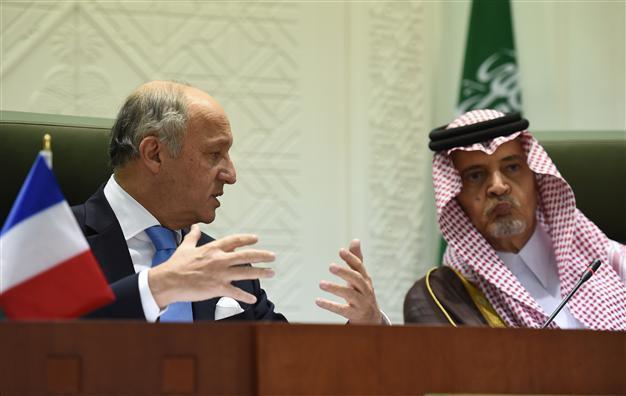Coalition strikes Yemen rebels as France voices support
SANAA / RIYADH

Saudi Minister of Foreign Affairs, Prince Saud al-Faisal bin Abdulaziz (R), listens to his French counterpart Laurent Fabius during a press conference held on April 12, 2015 in Riyadh. AFP Photo
Saudi-led air strikes hit a rebel base in central Yemen on April 12 and clashes raged in southern city Aden as France’s top diplomat voiced Western support for the air campaign in Riyadh.In the third week of strikes mounted by Saudi Arabia and its allies, French Foreign Minister Laurent Fabius said Paris was “naturally on the side of its regional partners for the restoration of stability in Yemen,” according to his entourage.
“Concerning Yemen, we are here to demonstrate our support, especially political, to the Saudi authorities,” Fabius told reporters as he began a series of meetings with the Saudi leadership including King Salman.
Saudi Arabia, an important ally of France, leads a coalition of nine Arab countries which since March 26 has carried out air strikes against the Houthi Shiite rebels who overran the capital Sanaa in September.
Riyadh feared the rebels would take over the entire country and move it into the orbit of Shiite Iran, Sunni Saudi Arabia’s regional rival.
On April 12, air strikes continued to target positions of the Houthis and their allies.
A pre-dawn strike hit Camp 22 in al-Dhahra in the south of Taez province killing 15 rebels or allied troops, a medic at al-Thawra hospital said.
The base belongs to the elite Republican Guard which remained loyal to former president Ali Abdullah Saleh after he was forced from power in 2012 following a year of nationwide protests against his three-decade rule.
Saleh has allied his followers with the Houthi rebels in their battle against forces loyal to fugitive President Abedrabbo Mansour Hadi.
The Saudi-led coalition said on April 11 that it had conducted 1,200 air strikes since March 26 and neutralized the air and missile capabilities of the rebels and their allies.
The air campaign, which has been accompanied by a naval blockade, was launched as the rebels closed in on Hadi’s refuge in Aden.
The president escaped to neighboring Saudi Arabia as the rebels and their allies entered the port city sparking fierce fighting with his loyalists.
Four civilians were shot dead in the city’s Mualla and Dar Saad districts on April 11, a medic at the Ba-Suhaib military hospital said.
A Hadi loyalist blamed rebel snipers for the deaths.
In the west of Aden, five rebels and three loyalist militiamen were killed in clashes that flared as the rebels tried to advance towards the city’s oil refinery, sources on both sides said.
Since the air campaign began, fighting has flared in 15 of Yemen’s 22 provinces.
These include Aden, Daleh, Lahj, Abyan and Shabwa in the formerly independent south, where locally recruited militia have remained loyal to Hadi.
Taez, Ibb, Baida, Hodeida, Raymah, Amran, Hajja, Saada, Jawf and Marib have seen clashes between the rebels and tribes loyal to Hadi, or with Saudi troops across the border.
Meanwhile, al-Qaeda militants have taken advantage of the security vacuum to seize control of Mukalla, the capital of Hadramawt province in the southeast.
Humanitarian agencies have managed to deliver more aid. On April 11, a Red Cross plane landed in Sanaa with more than 35 tons of medical aid and equipment. It followed two flights on Friday organized by the International Committee of the Red Cross and the United Nations, each carrying 16 tons of medicine and equipment in the first aid delivery since the air war began.
A Russian naval vessel evacuated 308 people of various nationalities from Aden, a defense ministry official said in Moscow.
They included 45 Russians, 18 Americans, five Britons and 159 Yemenis, as well as citizens of other Middle Eastern and former Soviet states and were expected to arrive in the Djibouti later on Sunday.
The U.N. refugee agency UNHCR says at least 900 people, most of them Somalis, but also including Yemenis, have arrived in the Horn of Africa in the past 10 days.
















